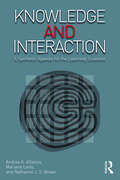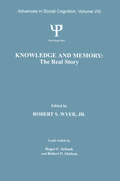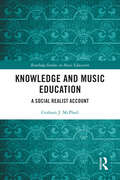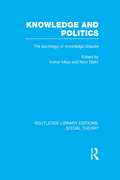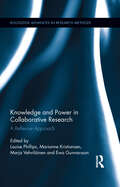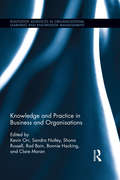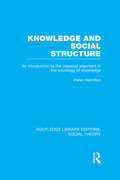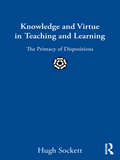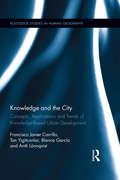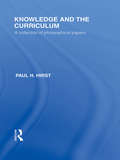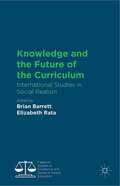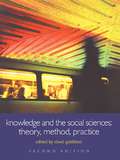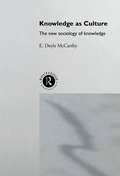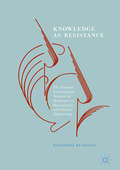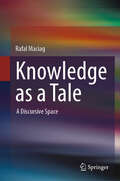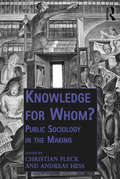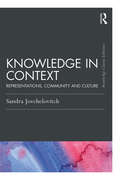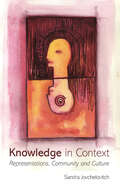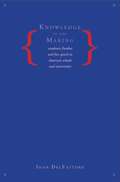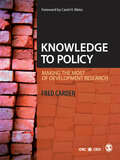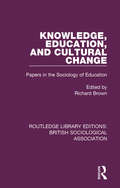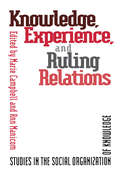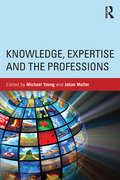- Table View
- List View
Knowledge and Interaction: A Synthetic Agenda for the Learning Sciences
by Andrea A. DiSessa Mariana Levin Nathaniel J.S. BrownDecades of research in the cognitive and learning sciences have led to a growing recognition of the incredibly multi-faceted nature of human knowing and learning. Up to now, this multifaceted nature has been visible mostly in distinct and often competing communities of researchers. From a purely scientific perspective, "siloed" science—where different traditions refuse to speak with one another, or merely ignore one another—is unacceptable. This ambitious volume attempts to kick-start a serious, new line of work that merges, or properly articulates, different traditions with their divergent historical, theoretical, and methodological commitments that, nonetheless, both focus on the highly detailed analysis of processes of knowing and learning as they unfold in interactional contexts in real time. Knowledge and Interaction puts two traditions in dialogue with one another: Knowledge Analysis (KA), which draws on intellectual roots in developmental psychology and cognitive modeling and focuses on the nature and form of individual knowledge systems, and Interaction Analysis (IA), which has been prominent in approaches that seek to understand and explain learning as a sequence of real-time moves by individuals as they interact with interlocutors, learning environments, and the world around them. The volume’s four-part organization opens up space for both substantive contributions on areas of conceptual and empirical work as well as opportunities for reflection, integration, and coordination.
Knowledge and Memory: Advances in Social Cognition, Volume VIII (Advances in Social Cognition Series)
by Robert S. Wyer Robert P. Abelson Roger C. SchankNarrative forms of mental representation and their influence on comprehension, communication and judgment, have rapidly become one of the main foci of research and theory in not only psychology but also other disciplines, including linguistics, sociology, and anthropology. No one has been more responsible for the awakening of interest in this area than Roger Schank and Bob Abelson. In their target article, they argue that narrative forms of mental representation, or "stories," are the basic ingredients of social knowledge that play a fundamental role in the comprehension of information conveyed in a social context, the storage of this information in memory, and the later communication of it to others. After explicating the cognitive processes that underlie the construction of narratives and their use in comprehension, memory and communication, the chapter authors consider the influence of stories on a number of more specific phenomena, including political judgment, marital relations and memory distortions that underlie errors in eyewitness testimony. The provocativeness of the target chapter is matched by that of the companion articles, each of which not only provides an important commentary on Schank and Abelson's conceptualization, but also makes an important contribution to knowledge in its own right. The diversity of perspectives reflected in these articles, whose authors include researchers in linguistics, memory and comprehension, social inference, cognitive development, social judgment, close relationships, and social ecology, testifies to the breadth of theoretical and empirical issues to which the target chapter is potentially relevant. This volume is a timely and important contribution to research and theory not only in social cognition but in many other areas as well.
Knowledge and Music Education: A Social Realist Account (Routledge Studies in Music Education)
by Graham J. McPhailKnowledge and Music Education: A Social Realist Account explores current challenges for music education in relation to wider philosophical and political debates, and seeks to find a way forward for the field by rethinking the nature and value of epistemic knowledge in the wake of postmodern critiques. Focusing on secondary school music, and considering changes in approaches to teaching over time, this book seeks to understand the forces at play that enhance or undermine music’s contribution to a socially just curriculum for all. The author argues that the unique nature of disciplinary-derived knowledge provides students with essential cognitive development, and must be integrated with the turn to more inclusive, student-centred, and culturally responsive teaching. Connecting theoretical issues with concrete curriculum design, the book considers how we can give music students the benefits of specialised subject knowledge without returning to a traditional past.
Knowledge and Politics: The Sociology of Knowledge Dispute (Routledge Library Editions: Social Theory #Vol. 28)
by Nico Stehr Volker MejaKarl Mannheim’s Ideology and Utopia has been a profoundly provocative book. The debate about politics and social knowledge that was spawned by its original publication in 1929 attracted the most promising younger scholars, some of whom shaped the thought of several generations. The book became a focus for a debate on the methodological and epistemological problems confronting German social science. More than thirty major papers were published in response to Mannheim’s text. Writers such as Hannah Arendt, Ernst Robert Curtius, Max Horkheimer, Herbert Marcuse, Helmuth Plessner, Hans Speier and Paul Tillich were among the contributors. Their positions varied from seeing in the sociology of knowledge a sophisticated reformulation of the materialist conception of history to linking its popularity to a betrayal of Marxism. The English publication in 1936 defined formative issues for two generations of sociological self-reflection. Knowledge and Politics provides an introduction to the dispute and reproduces the leading contributions. It sheds new light on one of the greatest controversies that have marked German social science in the past hundred years.
Knowledge and Power in Collaborative Research: A Reflexive Approach (Routledge Advances in Research Methods #6)
by Louise Phillips Ewa Gunnarsson Marianne Kristiansen Marja VehviläinenCollaborative research embraces a multiplicity of practices in which social actors are invited to participate in the research process as co-producers of knowledge. But what is actually meant by “co-production” in collaborative research? Knowledge and Power in Collaborative Research presents a range of critical, reflexive strategies for understanding and tackling the challenges emanating from the tensions that arise in the meeting between different participants, knowledge forms and knowledge interests. The chapters anchor discussion of ethical, epistemological and methodological questions in sustained empirical analyses of cases of collaborative knowledge production. The book covers diverse theoretical approaches such as dialogic communication theory, actor network theory, poststructuralist writing as inquiry, institutional ethnography, dialogic action research, and pragmatic action research. The empirical cases span a broad spectrum of empirical fields of social practice: health services, organisational change, research, science communication, environmental communication in intermediary NGOs, participatory governance in relation to urban planning, and digital communication and virtual worlds.
Knowledge and Power in Prehistoric Societies
by Lynne KellyIn this book, Lynne Kelly explores the role of formal knowledge systems in small-scale oral cultures in both historic and archaeological contexts. In the first part, she examines knowledge systems within historically recorded oral cultures, showing how the link between power and the control of knowledge is established. Analyzing the material mnemonic devices used by documented oral cultures, she demonstrates how early societies maintained a vast corpus of pragmatic information concerning animal behavior, plant properties, navigation, astronomy, genealogies, laws and trade agreements, among other matters. In the second part Kelly turns to the archaeological record of three sites, Chaco Canyon, Poverty Point and Stonehenge, offering new insights into the purpose of the monuments and associated decorated objects. This book demonstrates how an understanding of rational intellect, pragmatic knowledge and mnemonic technologies in prehistoric societies offers a new tool for analysis of monumental structures built by non-literate cultures.
Knowledge and Practice in Business and Organisations (Routledge Advances in Organizational Learning and Knowledge Management)
by Kevin Orr Sandra Nutley Shona Russell Rod Bain Bonnie Hacking Clare MoranKnowledge and Practice in Business and Organisations contributes to scholarly understanding of knowledge and practice, mapping the conceptual terrain, providing a critical review of debates in the field and setting out key theoretical perspectives. Knowledge and practice are explored in a range of organisational and policy settings through six context-specific discussions. The collection helps shape the field, identify areas for future research inquiry, and suggest implications for practitioners. The range of sites of inquiry represented in the book (e.g. craft working, accounting, public sector organisations, creative industries, health care, and so on) make the book distinctive, enabling the reader to connect debates and ideas from across a range of sectors and disciplines. The book charts different currents of debate which have hitherto tended to remain unconnected. In one accessible volume, this book provides an excellent introduction to a set of concepts that have animated scholarly conversations across a range of disciplines and provides cases and examples of practices which come from beyond any one particular sector. Aimed at researchers and academics in the field, this book is valuable source, helping define and progress the scholarly debate.
Knowledge and Social Structure: An Introduction to the Classical Argument in the Sociology of Knowledge (Routledge Library Editions: Social Theory)
by Peter HamiltonThe primary concern of this study is to present, elucidate and analyse the developments which have characterized the sociology of knowledge, and which have set for it the outlines of its major problematics. Peter Hamilton examines the most distinctive approaches to the determinate relationship between knowledge and social structure. He considers the three main ‘pre-paradigms’ of the sociology of knowledge based on the work of Marx, Durkheim and Weber, and looks at the contribution of Scheler, Mannheim and phenomenological studies to this complex field. He explores the intellectual context, particularly that of Enlightenment philosophy, in which the problems involved in producing a sociology of knowledge first came to light. In conclusion, the author suggests an inclusive perspective for approaching the difficulties posed in any attempt to describe and explain relations between knowledge and social structure.
Knowledge and Virtue in Teaching and Learning: The Primacy of Dispositions
by Hugh SockettThe challenge this book addresses is to demonstrate how, in teaching content knowledge, the development of intellectual and moral dispositions as virtues is not merely a good idea, or peripheral to that content, but deeply embedded in the logic of searching for knowledge and truth. It offers a powerful example of how philosophy of education can be brought to bear on real problems of educational research and practice – pointing the reader to re-envision what it means to educate children (and how we might prepare teachers to take on such a role) by developing the person, instead of simply knowledge and skills. Connected intimately to the practice of teaching and teacher education, the book sets forth an alternative theory of education where the developing person is at the center of education set in a moral space and a political order. To this end, a framework of public and personal knowledge forms the content, to which personal dispositions are integral, not peripheral. The book’s pedagogy is invitational, welcoming its readers as companions in inquiry and thought about the moral aspects of what we teach as knowledge.
Knowledge and the City: Concepts, Applications and Trends of Knowledge-Based Urban Development (Routledge Studies in Human Geography #52)
by Tan Yigitcanlar Francisco Javier Carrillo Blanca García Antti LönnqvistThis book underlines the growing importance of knowledge for the competitiveness of cities and their regions. Examining the role of knowledge - in its economic, socio-cultural, spatial and institutional forms - for urban and regional development, identifying the preconditions for innovative use of urban and regional knowledge assets and resources, and developing new methods to evaluate the performance and potential of knowledge-based urban and regional development, the book provides an in-depth and comprehensive understanding of both theoretical and practical aspects of knowledge-based development and its implications and prospects for cities and regions.
Knowledge and the Curriculum (International Library of the Philosophy of Education Volume 12): A Collection of Philosophical Papers
by Paul H. HirstThe papers in this volume provide a coherent philosophical study of a group of important and pressing educational issues such as the selection of objectives for less able children, the fundamental characteristics of teaching and the integration of the curriculum. A thesis on the necessary differentiation of knowledge into logically distinct forms is outlined, and is defended against recent philosophical criticisms. Its implications for curriculum planning are examined, with particular reference to the urgent problems of adeqately characterizing liberal education and those forms of moral and religious education that are appropriate in maintained schools.
Knowledge and the Future of the Curriculum
by Brian Barrett Elizabeth RataThis collection explores why powerful knowledge matters for social justice and discusses its implications for curriculum and pedagogy. The contributors argue that the purpose of education is to provide all students with access to powerful knowledge so that they acquire the means to move beyond their experiences and enhance their lives.
Knowledge and the Social Sciences: Theory, Method, Practice
by David GoldblattKnowledge and the Social Sciences takes as its point of departure the claims that all forms of knowledge, the social sciences included, must be seen and understood in their social context. It argues that the social sciences both describe and transform their object of study, though rarely in ways that social scientists intend, and introduces students to the key epistemological and philosophical terms and issues essential for further study in the social sciences.In a radical and yet lucid and practical introduction to ways of thinking and knowing in the social sciences this text investigates:* the origins and consequences of different types of knowledge in substantive areas of social change: medical practice, religious beliefs, and the environment* whether there is a decline in public trust of expert knowledge systems* whether we are entering a knowledge society, a fragmented post-modern society, or a risk society.
Knowledge as Culture: The New Sociology of Knowledge
by E. Doyle McCarthyDrawing on the Marxist, French structuralist and American pragmatist traditions, this is a lively and accessible introduction to the sociology of knowledge.
Knowledge as Resistance
by Stevienna De SailleThis book presents a historicised account of the Feminist International Network of Resistance to Reproductive and Genetic Engineering (FINRRAGE). A coordinated effort during the 1980s and 1990s by an international group of women to create and disseminate feminist knowledge about the then-new field of reproductive technologies. Bringing insights from science and technology studies together with social movements and feminist theory, it seeks to examine larger questions about knowledge and expertise in activist engagements with rapidly-developing technologies, as well as explore an important and neglected episode of feminist history. Its findings will be relevant to scholars in science studies, gender and women's studies and social movements, as well as to anyone with an interest in reproductive technologies and the history of feminist activism.
Knowledge as a Tale: A Discursive Space
by Rafal MaciagThis text describes the process that led to knowledge becoming the most important modern good and a complex phenomenon beginning at the end of the 19th century. It was a change in the way of understanding the world proposed by mathematics and geometry. This volume reveals how the paradigm shift, still in progress, is gradually transforming less obvious fields of science, such as the humanities and social sciences while affecting the phenomenon of knowledge. Firstly, meta-analysis gained importance, and secondly, it became natural to perceive knowledge in a social context, showing its diverse and multi-cause dispersion, leading to the phenomenon of knowledge. Due to the interpretation of knowledge as a complex social phenomenon, the author proposes a new model of knowledge description, called the theory of discursive space, making it possible to describe the role and meaning of knowledge as a component of modern civilization that is all-encompassing. This text appeals to students and researchers working in the philosophy of technology.
Knowledge for Whom?: Public Sociology in the Making (Public Intellectuals and the Sociology of Knowledge)
by Christian FleckThis ground-breaking volume is a follow-up to Intellectuals and Their Publics. In contrast to the earlier book, which was mainly concerned with the activity of intellectuals and how it relates to the public, this volume analyses what happens when sociology and sociologists engage with or serve various publics. More specifically, this problem will be studied from the following three angles: How does one become a public sociologist and prominent intellectual in the first place? (Part I) How complex and complicated are the stories of institutions and professional associations when they take on a public role or tackle a major social or political problem? (Part II) How can one investigate the relationship between individual sociologists and intellectuals and their various publics? (Part III) This book will be of interest to academics and students working in the fields of the sociology of knowledge and ideas, the history of social sciences, intellectual history, cultural sociology, and cultural studies.
Knowledge in Context: Representations, Community and Culture (Psychology Press & Routledge Classic Editions)
by Sandra JovchelovitchIn this classic edition of her groundbreaking text Knowledge in Context, Sandra Jovchelovitch revisits her influential work on the societal and cultural processes that shape the development of representational processes in humans. Through a novel analysis of processes of representation, and drawing on dialogues between psychology, sociology and anthropology, Jovchelovitch argues that representation, a social psychological construct relating Self, Other and Object-world, is at the basis of all knowledge. Exploring the dominant assumptions of western conceptions of knowledge and the quest for a unitary reason free from the ‘impurities’ of person, community and culture, Jovchelovitch recasts questions related to historical comparisons between the knowledge of adults and children, ‘civilised’ and ‘primitive’ peoples, scientists and lay communities and examines the ambivalence of classical theorists such as Piaget, Vygotsky, Freud, Durkheim and Lévy-Bruhl in addressing these issues. Featuring a new introductory chapter, the author evaluates the last decade of research since Knowledge in Context first appeared and reassesses the social psychology of the contemporary public sphere, exploring how challenges to the dialogicality of representations reconfigure both community and selfhood in this early 21st century. This book will make essential reading for all those wanting to follow debates on knowledge and representation at the cutting edge of social, cultural and developmental psychology, sociology, anthropology, development and cultural studies.
Knowledge in Context: Representations, Community and Culture (Psychology Press And Routledge Classic Editions Ser.)
by Sandra JovchelovitchThis book explores the relationship between knowledge and context through a novel analysis of processes of representation. Sandra Jovchelovitch argues that representation, a social psychological construct relating self, other and object-world, is at the basis of all knowledge. Understanding its genesis and actualisation in individual and social life explains what ties knowledge to persons, communities and cultures. It is through representation that we can appreciate the diversity of knowledge, and it is representation that opens the epistemic function of knowing to emotional and social rationalities. Drawing on dialogues between psychology, sociology and anthropology, Jovchelovitch explores the dominant assumptions of western conceptions of knowledge and the quest for a unitary reason free from the ‘impurities’ of person, community and culture. She recasts questions related to historical comparisons between the knowledge of adults and children, ‘civilised’ and ‘primitive’ peoples, scientists and lay communities and examines the ambivalence of classical theorists such as Piaget, Vygotsky, Freud, Durkheim and Lévy-Bruhl in addressing these issues. Against this background, Jovchelovitch situates and expands Moscovici’s theory of social representations, developing a framework to diagnose and understand knowledge systems, how they relate to different communities and what defines dialogical and non-dialogical encounters between knowledges in contemporary public spheres. Diversity in knowledge, she shows, is an asset of all human communities and dialogue between different forms of knowing constitutes the difficult but necessary task that can enlarge the frontiers of all knowledges. Knowledge in context will make essential reading for all those wanting to follow debates on knowledge and representation at the cutting edge of social, cultural and developmental psychology, sociology, anthropology, development and cultural studies.
Knowledge in the Making: Academic Freedom and Free Speech in America's Schools and Universities
by Joan DelfattoreHow free are students and teachers to express unpopular ideas in public schools and universities? Not free enough, Joan DelFattore suggests. Wading without hesitation into some of the most contentious issues of our times, she investigates battles over a wide range of topics that have fractured school and university communities--homosexuality-themed children's books, research on race-based intelligence, the teaching of evolution, the regulation of hate speech, and more--and with her usual evenhanded approach offers insights supported by theory and by practical expertise. Two key questions arise: What ideas should schools and universities teach? And what rights do teachers and students have to disagree with those ideas? The answers are not the same for K-12 schools as they are for public universities. But far from drawing a bright line between them, DelFattore suggests that we must consider public education as a whole to determine how--and how successfully--it deals with conflicting views. When expert opinion clashes with popular belief, which should prevail? How much independence should K-12 teachers have? How do we foster the cutting-edge research that makes America a world leader in higher education? What are the free-speech rights of students? This uniquely accessible and balanced discussion deserves the full attention of everyone concerned with academic goals and agendas in our schools.
Knowledge in the Time of Cholera: The Struggle Over American Medicine in the Nineteenth Century
by Owen WhooleyVomiting. Diarrhea. Dehydration. Death. Confusion. In 1832, the arrival of cholera in the United States created widespread panic throughout the country. For the rest of the century, epidemics swept through American cities and towns like wildfire, killing thousands. Physicians of all stripes offered conflicting answers to the cholera puzzle, ineffectively responding with opiates, bleeding, quarantines, and all manner of remedies, before the identity of the dreaded infection was consolidated under the germ theory of disease some sixty years later. These cholera outbreaks raised fundamental questions about medical knowledge and its legitimacy, giving fuel to alternative medical sects that used the confusion of the epidemic to challenge both medical orthodoxy and the authority of the still-new American Medical Association. In Knowledge in the Time of Cholera, Owen Whooley tells us the story of those dark days, centering his narrative on rivalries between medical and homeopathic practitioners and bringing to life the battle to control public understanding of disease, professional power, and democratic governance in nineteenth-century America.
Knowledge to Policy: Making the Most of Development Research
by Fred CardenDoes research influence public policy and decision-making and, if so, how? This book is the most recent to address this question, investigating the effects of research in the field of international development. It starts from a sophisticated understanding about how research influences public policy and decision-making. It shows how research can contribute to better governance in at least three ways: by encouraging open inquiry and debate, by empowering people with the knowledge to hold governments accountable, and by enlarging the array of policy options and solutions available to the policy process. Knowledge to Policy: Making the Most of Development Research examines the consequences of 23 research projects funded by Canada′s International Development Research Centre (IDRC). Key findings and case studies from Asia, Africa, and Latin America are presented in a reader-friendly, journalistic style, giving the reader a deeper grasp and understanding of approaches, contexts, relationships and events. The book will be useful to academics, researchers and students of political science, public administration, development studies, and international affairs; professionals in donor and development organizations worldwide; policy- and decision-makers in government (local and national levels) and international arenas (particularly trade and finance); and development agencies and civil society (non-governmental) organizations concerned with integrating the voice of citizens into policy- and decision-making processes.
Knowledge, Education, and Cultural Change: Papers in the Sociology of Education (Routledge Library Editions: British Sociological Association #3)
by Richard BrownOriginally published in 1973 Knowledge, Education and Cultural Change surveys the present state of the field of the sociology of education. The book addresses the claim that much of the research in the sociology of education should be extended to issues of wider theoretical significance, the book provides theoretically informed analysis of situations or processes, developing new theoretical perspectives and concepts. The papers also reflect the appropriate theoretical framework for the sociology of education. Underpinning this framework, it looks at the importance of social stratification, arguing that too much work in the sociology of education is carried out using oversimplified models.
Knowledge, Experience, and Ruling
by Marie Campbell Ann ManicomDorothy Smith is considered one of the most original sociologists and theorists of our time, and her writings have attracted much attention in Europe and the US as well as in Canada. This collection of original essays, written by scholars who worked or studied with Smith, exemplifies Smith's approach to social analysis.Each author takes an empirical approach. Some analyse texts (the maps and documents of land-use planning, photographs, an influential history of British India, reports of a task force on battered women); some draw on interviews (with clerical workers, with Japanese corporate wives), while others (an AIDS activist, a teacher of adult literacy, a social worker) reflect on personal experiences. In each case we are introduced to specific themes in Smith's approach. The essays put Smith's method to work in diverse ways and in the process offer intriguing insights into their topics.This tribute to Smith's empowering contribution as a thinker and teacher reveals how empirical studies can illuminate concepts usually presented in the abstract. As the first compilation of applications of Smith's methodology, this is a landmark work in the developing field of the social organization of knowledge.
Knowledge, Expertise and the Professions
by Michael Young Johan MullerIt has long been recognised that specialised knowledge is at the core of what distinguishes professions from other occupations. The privileged status of professions in most countries, however, together with their claims to autonomy and access to specialised knowledge, is being increasingly challenged both by market pressures and by new instruments of accountability and regulation. Established and emerging professions are increasingly seen as either the solution, or as sources of conservatism and resistance to change in western economies, and recent developments in professional education draw on a competence model which emphasises what newly qualified members of a profession ‘can do’ rather than what ‘they know’. This book applies the disciplines of the sociology of knowledge and epistemology to the question of professional knowledge. What is this knowledge? It goes beyond traditional debates between ‘knowing how’ and ’knowing that’, and ‘theory’ and ‘practice’. The chapters cover a wide range of issues, from discussions of the threats to the knowledge base of established professions including engineers and architects, to the fraught situations faced by occupations whose fragile knowledge base and professional status is increasingly challenged by new forms of control. While recognising that graduates seeking employment as members of a profession need to show their capabilities, the book argues for reversing the trend that blurs or collapses the skill/knowledge distinction. If professions are to have a future then specialised knowledge is going to be more important than ever before. Knowledge, Expertise and the Professions will be key reading for students, researchers and academics in the fields of professional expertise, further education, higher education, the sociology of education, and the sociology of the professions.
